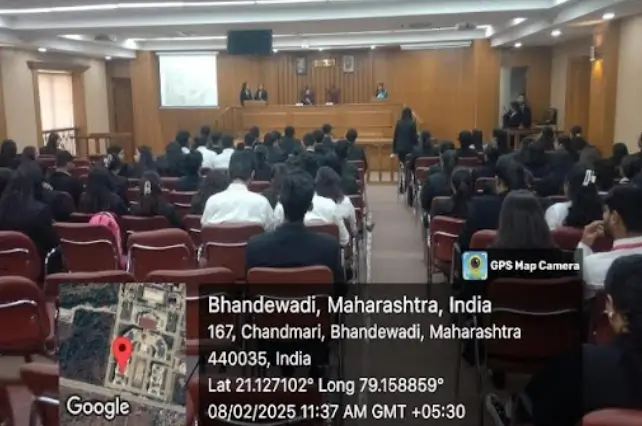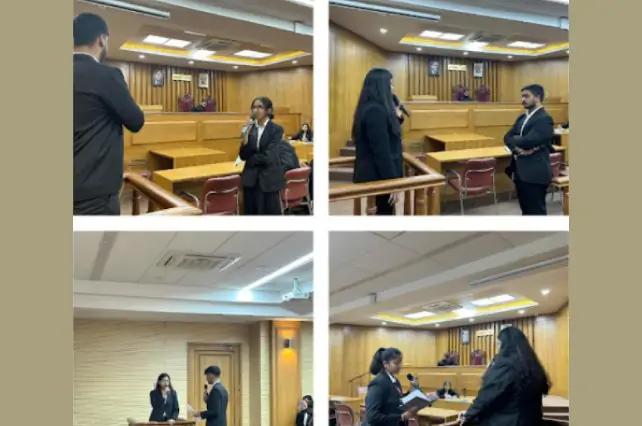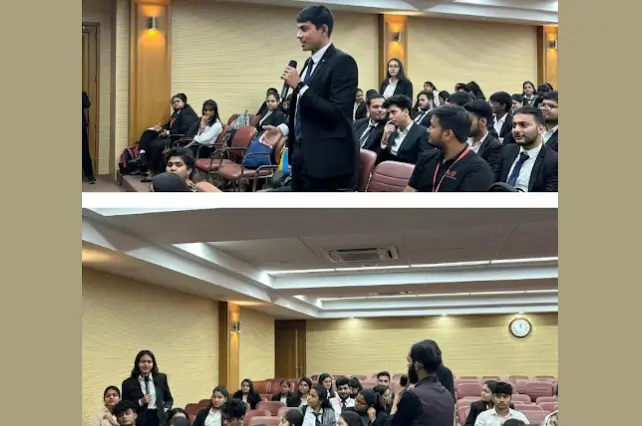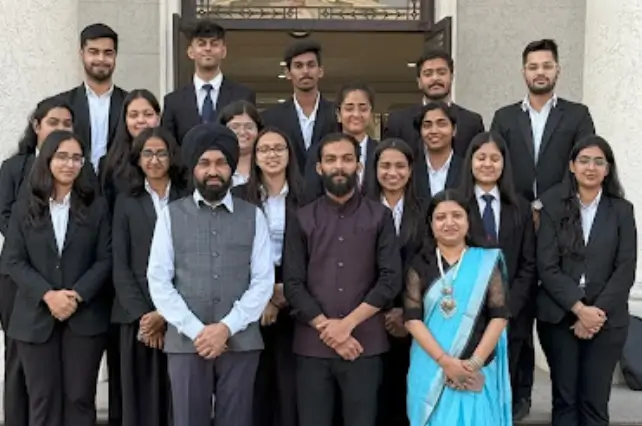Happenings
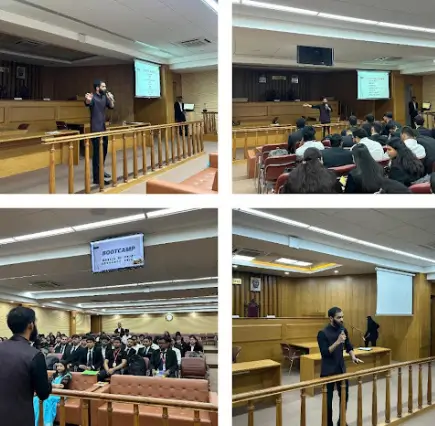
The Symbiosis Centre for Advocacy Skills and Litigation, Nagpur organized the Bootcamp on the basis of Trial advocacy as part of 2nd Intra Trial Advocacy Competition, 2025. It was organized on February 8, 2025. The session equipped the students with necessary skills and knowledge required for participating in the 2nd Intra Trial Advocacy Competition, 2025.
The Bootcamp covered Interactive session with the resource person and a Mock Trial in which the students will present a hypothetical case and the process of trial.
Inauguration
The Resource person for the session was Adv. Mayur Dhatavkar Sir. He is a practicing advocate in the fields of Criminal Law, Family Law, Consumer law, and Cyber Law. He is a regularly practicing advocate in courts such as the Hon’ble Sessions Court, and Hon’ble Family Court in various districts in Maharashtra, and in the Hon’ble Bombay High Court.
The Theoretical Approach
In the first half, he explained the theoretical aspect of Trial Advocacy. The theoretical foundation of trial advocacy is built upon principles of legal reasoning, persuasive argumentation, and evidentiary rules. It requires mastery of courtroom procedures, strategic case analysis, and an understanding of the law of evidence. Evidence plays a pivotal role in trial advocacy and can be categorized into various types, including direct evidence, which directly proves a fact (such as eyewitness testimony), and circumstantial evidence, which relies on inference to establish a conclusion. Documentary evidence, such as contracts, emails, or forensic reports, serves as written proof, while real evidence, like physical objects or crime scene artifacts, provides tangible support for claims. Demonstrative evidence, including charts, diagrams, and simulations, aids in simplifying complex information for the judge or jury. Testimonial evidence, presented through witness statements or expert opinions, forms the core of most trials. Effective trial advocacy requires the skillful presentation and cross-examination of such evidence to strengthen a client’s position while adhering to ethical and procedural guidelines.
Practical Approach
Then, after lunch, he continued with the session where he explained the practical approach to Trial advocacy. He continued the session by explaining the practical aspect of trial advocacy revolves around the effective presentation of evidence, examination of witnesses, and adherence to procedural rules to establish a compelling case before the court. A trial advocate must proficiently handle all types of evidence, including direct, circumstantial, documentary, real, demonstrative, and testimonial evidence, ensuring their proper admissibility and strategic use. One of the crucial documentary pieces in criminal trials is the panchnama, which records evidence discovered during police investigations, such as seizures, spot inspections, and witness statements, serving as key corroborative proof. Witness examination is the backbone of trial proceedings and involves three primary stages: examination-in-chief, where the party calling the witness elicits favourable facts; cross-examination, where the opposing counsel tests the witness's credibility, consistency, and reliability; and re-examination, which allows for clarification of ambiguities raised during cross-examination. Additionally, expert witness testimonies, forensic reports, and circumstantial evidence play a vital role in reinforcing arguments. A trial advocate must also effectively raise objections, counter opposing arguments, and adhere to rules of evidence while maintaining persuasive courtroom conduct. Mastering these practical elements ensures a well-structured and convincing trial strategy aimed at securing justice.
Mock Trial
The session continued with a mock trial conducted by the members of the Symbiosis Centre for Advocacy Skills and Litigation, where they demonstrated the practical application of trial advocacy. The mock trial showcased key aspects of courtroom proceedings, including the presentation of different types of evidence—direct, circumstantial, documentary, real, demonstrative, and testimonial. The participants skillfully conducted examination-in-chief, cross-examination, and re-examination of witnesses, illustrating how advocates build and challenge a case. A crucial part of the demonstration included the introduction of a panchnama, emphasizing its role in corroborating facts and establishing the chain of events in criminal trials. The session also highlighted procedural strategies, objection handling, and persuasive argumentation, giving attendees an insightful understanding of the dynamics of trial advocacy in a real courtroom setting.
Question-Answer Session
Then, the session was followed by an interactive question-and-answer round, where the speaker elaborated on the dos and don’ts of trial advocacy. He emphasized the importance of thorough case preparation, mastery of evidentiary rules, and effective courtroom demeanor. Among the key do’s, he highlighted maintaining clarity in arguments, asking precise questions during witness examination, and adhering to procedural etiquette. He also stressed the significance of handling objections strategically and ensuring that evidence is presented in a manner that strengthens the case. On the other hand, he cautioned against common mistakes such as leading questions during examination-in-chief, making speculative arguments, disregarding courtroom decorum, or over-relying on emotions rather than legal reasoning. The interactive nature of the session allowed participants to clarify doubts, gain practical insights, and refine their advocacy skills through expert guidance.
Valedictory Ceremony
The Bootcamp session concluded at 4 PM with a formal vote of thanks delivered by the cell in charge. In the closing remarks, gratitude was expressed to the esteemed speaker for sharing invaluable insights on trial advocacy, the members of the Symbiosis Centre for Advocacy Skills and Litigation for organizing a well-structured session, and the participants for their enthusiastic engagement. The session was acknowledged as a valuable learning experience, equipping attendees with a deeper understanding of courtroom procedures, evidentiary rules, and advocacy techniques. The event ended on a positive note, reinforcing the importance of practical legal training and fostering a culture of skill-based learning among aspiring advocates.
